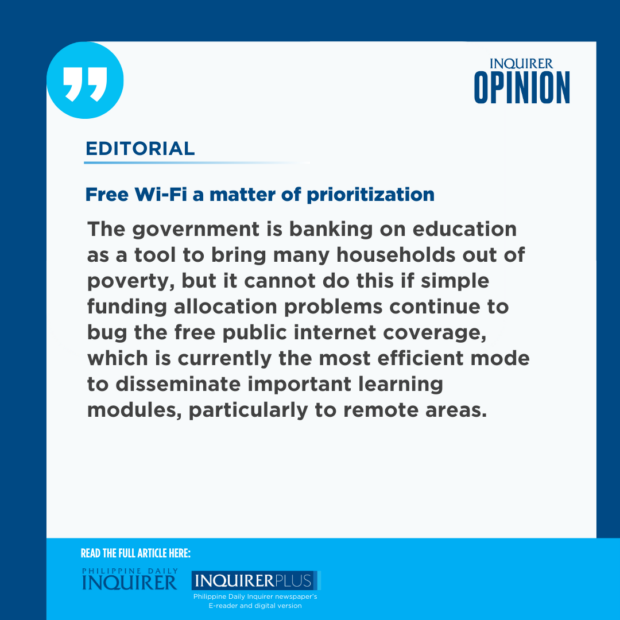
Just days after President Marcos lauded the government’s free internet program, the Department of Communication and Information Technology (DICT) announced that some 2,600 free Wi-Fi sites across the country went offline due to the government’s inability to pay the telecommunication contractors. The reason, which is rather disheartening, is that the Department of Budget and Management (DBM) failed to release on time the money needed to continue the project.
Information and Communications Secretary Ivan John Uy noted that the number of offline sites represented 20 percent of the more than 13,000 free Wi-Fi sites across the archipelago and included those in remote areas where internet access is already lacking. Uy lamented that they have been asking for the funds to be released as early as December last year and the DICT has been following this up since. He warned that these sites may stay offline for at least 60 days if the DBM continues to delay the release of the money. “If the fund disbursement is late, we won’t be able to renew the contracts immediately. When the contract expires, we need to undergo rebidding,” Uy pointed out, referring to the legal requirements in the government procurement law.
Ambitious program
This is saddening considering that the free Wi-Fi program has been making headway since it was launched by the DICT in 2017 as part of an ambitious government program to provide free internet to all citizens in all public places in the country. It aims to bring free connectivity in public places across the country, including public parks, plazas, libraries, barangay centers, national and local government offices, public schools and hospitals, state universities and colleges, rural health units, and airports, seaports, and public transport terminals.
In its latest report, the DICT said the program has benefited 9.8 million users across 1,401 cities and municipalities, including 3,040 geographically isolated and disadvantaged areas. In a bid to accelerate the program’s rollout, the DICT even partnered with the United Nations Development Program in 2018 for an additional 6,000 so-called last-mile sites or those located in the remotest, unserved, and disadvantaged communities.
During his third State of the Nation Address (Sona) on July 22, Mr. Marcos vowed to expand the government’s free Wi-Fi program further and to use policy reforms and streamlined common tower processes to provide better internet connectivity to the farthest reaches of the country and ensure that more Filipinos benefit from having free internet coverage. But this can never happen if a simple funding issue such as what the DICT chief is complaining about will continue to hound the program.
Unserved areas
Malacañang needs to direct the DBM to immediately release the money needed to restart the 2,600 offline sites and renew in a timely manner their existing contracts. It simply boils down to fund prioritization, not a lack of funds. Remember that the Department of Finance only recently issued a memorandum directing all state-owned agencies and firms to remit to the Treasury all their unused subsidies for use in contingent expenses.
Mr. Marcos must also prod Congress to give more funding to the DICT for the free Wi-Fi program. Uy said that the agency would need an additional P5 billion to fund the program’s expansion to the remaining areas without free internet coverage. Again, this will simply be a matter of funding prioritization for lawmakers, who are now deliberating on the proposed P6.3-trillion national budget for 2025.
For private telecom companies, there is a provision in the Philippine Telecommunication Act (Republic Act No. 7925) that mandates them to prioritize extending basic services to unserved areas.
Low internet penetration
The government, particularly the DICT and Congress, should look into the record of big companies such as PLDT and Globe in complying with this provision of the law that was enacted way back in 1995. These telecom firms have to address what the President calls a low internet penetration. As of 2022, an estimated 77 percent, or 20.6 million households in the country, were connected to the internet, a level that the President said in his Sona “is much too low.” Private companies, with the billions of pesos they generate in profit each year, should show some compassion to do more to help the government’s free Wi-Fi program succeed.
Free Wi-Fi will help ensure that people from disadvantaged communities improve their educational attainment, deepen their awareness of local government services, and provide them with opportunities to uplift their economic conditions. The government is banking on education as a tool to bring many households out of poverty, but it cannot do this if simple funding allocation problems continue to bug the free public internet coverage, which is currently the most efficient mode to disseminate important learning modules, particularly to remote areas.